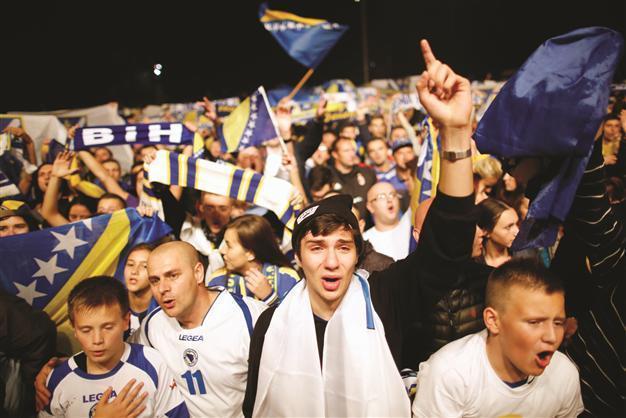Football offers example for healing Bosnia’s ethnic divide
SARAJEVO - Reuters

Thousands of football fans have poured in to Sarajevo streets to celebrate Bosnia and Herzegovina’s historic success of qualifying for the 2014 FIFA World Cup. REUTERS photo
Bosnia’s international footballers have offered their political leaders a valuable lesson: see what you can achieve when you set aside your ethnic divisions.Last week the national football side won a place at the World Cup finals for the first time, two years after Bosnia was briefly suspended from international competition for letting ethnic politics pervade the sport.
Under a reformed football federation, Bosnia automatically qualified for Brazil next year. Bosnians let off fireworks and honked car horns long into the night in Sarajevo when their team qualified, embracing a moment of joy after the horrors of a war that pitted Muslims, Croats and Serbs against each other in the early 1990s.
The victory mattered all the more because the team is a beacon of progress and unity in a country still divided between ethnic groups, mired in corruption and quarrels, and floundering on the edge of the European mainstream it wants to join.
“My message today to Bosnian politicians is: follow the example of your footballers and live up to expectations of your citizens,” said European Union enlargement chief Stefan Fule the day after Bosnia qualified for the World Cup finals.
Nearly two decades after the civil war in which around 100,000 people were killed, the former Yugoslav republic’s problem is not so much that the ethnic groups don’t get along.
Dysfunctional set-up
A system created by the 1995 treaty that ended the war, giving each of the three ethnic groups a share of power and rotating important posts between them, has kept the peace. The problem is that this system breeds sleaze, the protecting of vested interests and paralysed decision-making.
Two years ago, Bosnia’s football federation mirrored the way the state is organized. Its presidency was run by a Serb, a Croat and a Muslim who took turns in the job every 16 months, in the same way that the state presidency works.
The system, say people involved in the sport, was dysfunctional. Officials were chosen on ethnic and political grounds rather than on competence.
Last December, the federation’s assembly elected its first single president for a four-year term and appointed a 15-member executive committee.
“We now have a national team which is not based on the grounds of who is who, but who is the best,” former player Ivica Osim, who advises the football federation. “If only politicians were as cohesive as this team.”
Ethnic suspicions linger. Most of Bosnia’s ethnic Serbs have traditionally supported the Serbian national team and many Bosnian Croats cheer for Croatia - although this may be changing.
Sasa Zivkovic, a graphic worker, watched the Bosnia-Lithuania match at home with friends. Zivkovic said many other people in the city cheered on the Bosnian team, though they don’t admit it because of “strong antagonism” towards anything connected to the Bosnian state.
“But people like winners. Bosnia is a winning team, so many things will change,” he said.
















